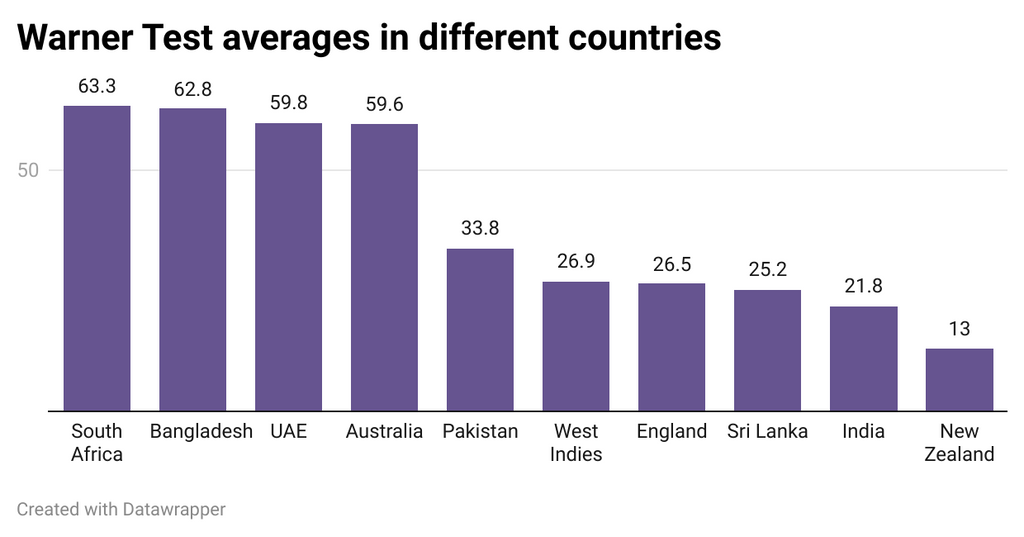
David Warner became the fifth-highest men’s Test run-scorer for Australia en route to his 26th ton against Pakistan in Perth on Thursday (December 14), taking his average in the format over 45. He will end his career as one of Australia’s finest batters, but his overseas record is a chip on his legacy, writes Sarah Waris.
Subscribe to the Wisden Cricket YouTube channel for post-match analysis, player interviews, and much more.
Warner, who is likely to hang up his boots after the SCG Test against Pakistan in the New Year, scored a scintillating 164, with the highlight being his onslaught against Shaheen Afridi. He surpassed Matthew Hayden and Michael Clarke during his innings to become the fifth-highest run-scorer for Australia in men’s Test cricket and he currently has 8,651 runs. He needs only 14 more to become the most successful opener for the team, the list being led by Hayden, who always opened in the 103 Tests he played (Warner has played three Test innings outside the top two batting positions).
Warner also became the third Australia men’s Test player to score 20 hundreds at home, where he averages 59.58 in 56 matches. Only five players from the country have made 5,000 or more Test runs in Australia, but none have a better average than Warner’s, highlighting how effective he has been when playing in familiar conditions.
Warner has played 17 bilateral series in Australia and has averaged over 50 on 11 occasions and more than 40 13 times, emerging as the biggest hurdle for visiting teams to remove over the years. The fact that Australia lost two of the four home series when Warner averaged fewer than 40 shows how crucial he has been in blunting both opposing attacks and their confidence.
That he also went long periods without an established opening partner further adds to his feats. Warner opened in 95 innings in Australia and had the longest partnership with Joe Burns, with the duo opening in 20 innings together. He has played alongside nine other openers thus far, walking out to bat with the same player more than 15 times only thrice.
But away from Australia, his numbers plummet, with his overseas average reading only 32.87 in 54 games. Warner has toured nine countries, making hundreds in three (Bangladesh, South Africa and the UAE), and averaging below 30 in five.
Even during the last two years of his career, when he was a “walking wicket” according to some, Warner did not let his average at home fall below 40 – he averaged 41.12 in 10 Tests, making two hundreds and a fifty, including a double ton, even as his away average fell to 25.56.

Warner’s Test career can be divided into two extremes: In the countries where he excelled he was wonderfully consistent, but in countries he struggled he was unable to break his streak.
Among all the cricketers who scored at least 2,000 runs away from home, Warner has the ninth-worst average. Of them, Dilip Vengsarkar is the only batter who batted in the top four and averaged worse than Warner.
In the last ten years, Warner is the only touring opener who has played more than 10 Tests in England without a single Test ton. He is also the only one to have played more than five games in India having not scored a hundred in the country. In arguably the two toughest venues for touring sides, Warner has struggled to post runs on the board, and while only a handful have succeeded in the above countries, his failures against Stuart Broad, R Ashwin and James Anderson (he has fallen to them 38 times combined) made his woes more pronounced.
It is not to say that Warner wasn’t a brute. To average nearly 60 at home without a reliable opening partner, even as Australia were going through a transition, is applaudable. He had a strike rate of nearly 70 when he scored a fifty away from home and made 22 fifties along with nine in England and three in India. When it came to converting his starts, Warner often struggled while touring, but he more than made up for it in Australia, where he made 14 hundreds and 20 centuries.
If that makes him a home-track bully, then so be it, but bowlers will tell you that irrespective of past records, he left them ill at ease until they saw his back, and that will remain Warner’s legacy.








